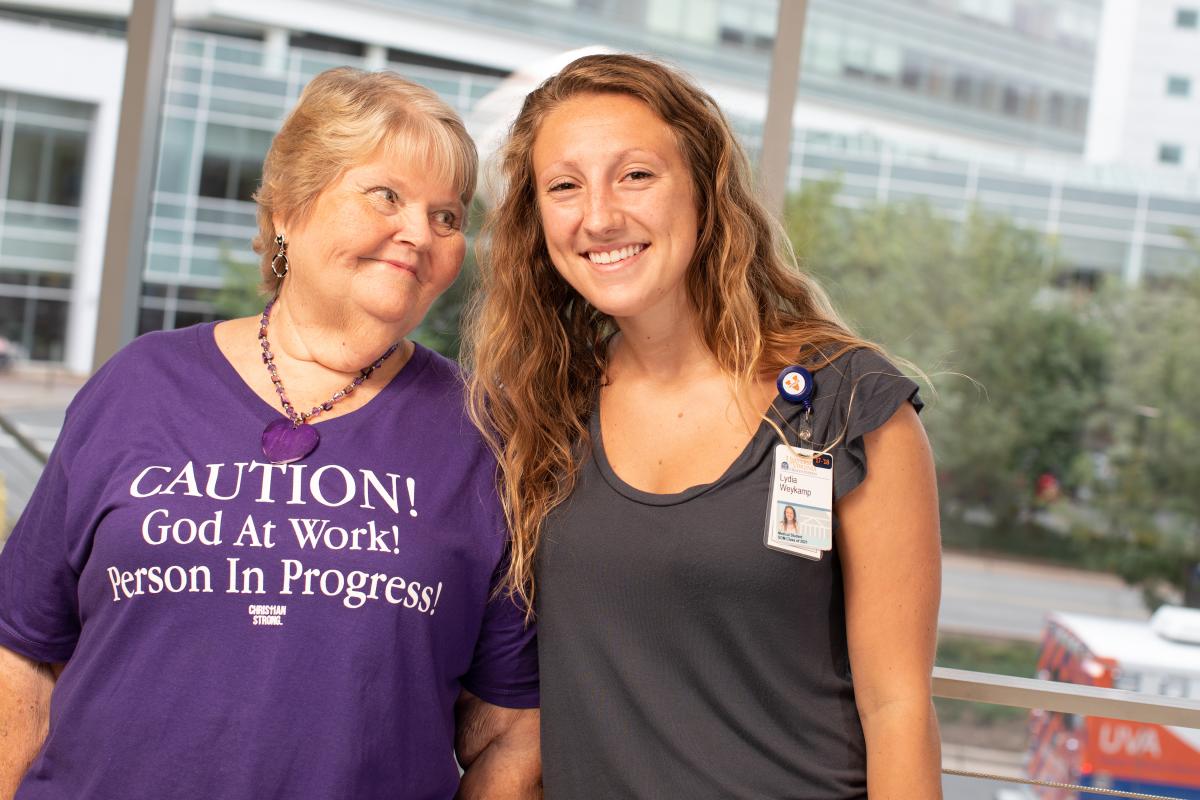This Partnership Teaches Medicine Through the Patient's Eyes
Lydia Weykamp, a second-year student at UVA School of Medicine, understands that each patient is more than an illness or diagnosis. And nothing has illustrated that point more vividly than her relationship with Susie Thacker, a UVA Health System patient who has numerous chronic conditions, including diabetes, heart disease, and asthma.
As Weykamp has gotten to know Thacker over the past year—through home visits, phone calls, and by accompanying Thacker to doctor’s appointments—she’s observed the challenges of managing multiple, complex illnesses. In recent months, for example, Thacker’s back pain, caused by spinal stenosis and degenerative disk disease, has become more severe.
Unfortunately, the approaching colder months could make it even worse. Thacker heats her home with a woodstove and lugs wood into the house several times a day during the winter.
“For someone with back pain, having to carry wood multiple times a day must be terrible,” Weykamp says. “But I came to see her back-pain diagnosis in a different light. Her doctors don’t know what she has to do every day—not unless they ask her, or she tells them. So it really is special to see what’s behind a simple diagnosis like that.”
Weykamp and Thacker were paired together last year as part of the School of Medicine’s Patient Student Partnership (PSP). Now a part of the curriculum, this program allows medical students to establish deeper, long-term relationships with patients. This experience adds a real-world context to their academic experiences.
“Hopefully, students will be able to make connections to what they are studying in their basic science courses through these relationships,” says Colleen Kiernan, Patient Student Partnership (PSP) coordinator.
The program, which aims to teach students to be patient advocates and effective communicators, grew out of the Phronesis Project pioneered by Margaret Plews-Ogan, MD. This fall, all 156 incoming medical students will be paired with a chronically ill Health System patient—mostly adults, but also some children with complex medical issues. Faculty mentors will help students navigate their patient relationships.
The program is unique in that medical students typically have little contact with patients during the first 18 months of medical school.
“We wanted to bring patient contact to the beginning of students’ academic experience, so they can be reminded of why they’re here,” says Rachel Kon, MD, course director of the program and assistant professor of general internal medicine. “During the clerkship years, students view a small window into patient care, but they don’t get to see the whole picture. As we move to a world where we’re treating a lot of chronic illnesses, we want to give each student a longitudinal relationship with a patient from the start and see the trajectory of chronic illness.”
The PSP will help students gain a wide range of professional skills, including narrative interviewing to learn a patient’s story, motivational interviewing to help patients set goals and action plans for behavioral changes, and basic health education. As students begin their fourth year of study, they will hand off their patients to incoming first-year students. Then the cycle starts all over.
For patients, a reward of volunteering for the PSP is gaining a new advocate for their healthcare team. Many also relish the opportunity to help train a new generation of doctors.
“This program is fantastic because it shows the medical students what the patient goes through—not so much the disease, because they can read about the symptoms in a medical textbook,” Thacker says. “But they don’t always know how the disease affects a person in their daily life until they sit down and talk with them. These students are learning to treat the patient as a person—not as a set of symptoms and diseases.”

